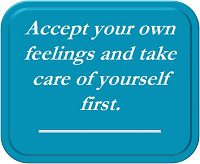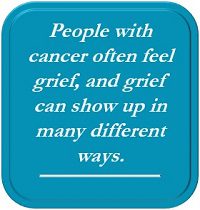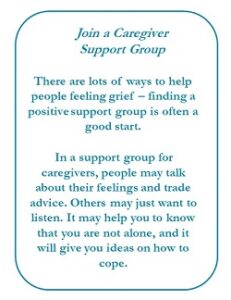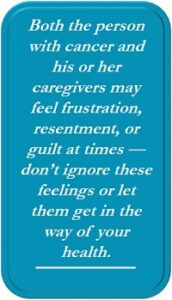Understanding Your Feelings
Caregiver Choices©
Who is a Caregiver?
Understanding Your Feelings
Getting Help
Taking Care of Your Loved One
Planning Ahead
Understanding Lung Cancer
Treatment for Lung Cancer
Lung Cancer Health Care Team
Questions for the Health Care Team
Prognosis
Key Decision Points in Care
Conclusion
Caregiver Resources
Afterword
About the Authors
About the Editors
Acknowledgments
Caregiver Choices© Menu
 Before reading more about lung cancer and the road ahead, stop for a second, and assess how YOU are going to take good care of yourself and manage your own well-being. Think about the emotions that you are experiencing and do not dismiss them. If you fail to take care of your own emotional well-being, you will not be able to be the best possible caregiver.
Before reading more about lung cancer and the road ahead, stop for a second, and assess how YOU are going to take good care of yourself and manage your own well-being. Think about the emotions that you are experiencing and do not dismiss them. If you fail to take care of your own emotional well-being, you will not be able to be the best possible caregiver.
We are all unique and react emotionally in different ways to stressful experiences. As a caregiver for someone with lung cancer, you may end up having many of the same feelings as the person with cancer. You and your loved one and other caregivers may also respond very differently. Regardless, it is essential that you recognize your own reaction and the reactions of others as valid.
As a caretaker, you may be inclined to act strong for those around you, especially for the person with lung cancer. But being strong does not mean repressing or dismissing your own emotions—it means noticing and caring for your own feelings so that you can be emotionally available to the person you’re caring for.
Grief
Grief comes with a loss of any kind. When someone is diagnosed with a serious illness such as lung cancer, patients and their families and friends find their lives turned upside down.
Everyone involved in the life of someone with cancer, including you as a caregiver, will grieve the loss of their routine and their former lives. This grief can emerge even when a cure or years of remission are possible. Often patients and families do not recognize their sadness or irritability as grief, or they grieve privately, not wishing to upset others.
Recognizing grief is part of good self-care. We encourage you to acknowledge your own grief and to share it with those around you. It is likely others are feeling the same emotions and will appreciate the opportunity to share their own feelings.
 Grief can show itself in many ways: anger, rejection, sadness, mood swings, irritability, denial—these are just a few of the ways that different people express their grief. Be aware of these feelings in yourself and in others and do your best to channel these emotions in positive and productive ways.
Grief can show itself in many ways: anger, rejection, sadness, mood swings, irritability, denial—these are just a few of the ways that different people express their grief. Be aware of these feelings in yourself and in others and do your best to channel these emotions in positive and productive ways.
An excellent place to start when trying to help someone deal with grief is to remember what has helped you and your loved ones get through tough times in the past. Unless you have led an unusually charmed life, it is likely that you have grieved before. Call upon those experiences for ideas. Perhaps when a loved one died, the person you are caring for found an activity that helped him or her through tough times. Maybe he or she enjoyed spending time with family, or dove deeper into religious activities, or just went to the movies with friends. Whatever helped in the past might just help again, even if the cause of the grief was far different from dealing with lung cancer.
Many people who are dealing with grief find that it helps to “get it out”. How you choose to take those feelings into the world is entirely up to you. One of the simplest ways is by talking to someone else about what you are going through. As a caregiver, you might be the first one that the person you are caring for turns to. In other cases, it may be more appropriate, comfortable, or helpful to talk with a trained counselor or therapist. Look for a professional who is educated and has experience in helping people deal with grief. Or you could write in a journal. Putting pen to paper can bring relief from grief, even if you never share these private thoughts with anyone else. Finally, one of the simplest ways is to choose an object to focus on that can draw your attention and take the place of your grief. For example, you and your loved one can light a candle of hope together.
While it is important that you help the person you are caring for manage grief, you must also remember that to be the best caregiver you can be, you must also deal with your own grief. You may be surprised to find that the person with cancer wants to hear about the grief that you are feeling and help you through it. Though it may not be the case for everyone, many people who are dealing with a serious illness and managing grief of their own find relief and even joy in helping others. This can be good for both of you. If talking about it seems to help, then speak with each other.
 Getting grief “out in front” of you in these ways can help manage it. It is healthy at times to help the other person think about things other than their illness and grief. A simple, discreet way that you can make this happen is by purposely creating casual situations to surround the person with cancer with friends and family. You can gather loved ones in traditional ways that will remind everyone of happy times—lingering over a shared meal is an enjoyable way to create this situation. At other times, putting together a big meal is not necessary and may feel too formal or just be too much work. In that case, hosting a simple movie night with friends and family for a few hours can really help all involved deal with their grief by merely being together. Any reason to gather people who love the person with cancer, and where disease and illness and grief are not the focus, can help raise everyone’s spirits.
Getting grief “out in front” of you in these ways can help manage it. It is healthy at times to help the other person think about things other than their illness and grief. A simple, discreet way that you can make this happen is by purposely creating casual situations to surround the person with cancer with friends and family. You can gather loved ones in traditional ways that will remind everyone of happy times—lingering over a shared meal is an enjoyable way to create this situation. At other times, putting together a big meal is not necessary and may feel too formal or just be too much work. In that case, hosting a simple movie night with friends and family for a few hours can really help all involved deal with their grief by merely being together. Any reason to gather people who love the person with cancer, and where disease and illness and grief are not the focus, can help raise everyone’s spirits.
Finally, it is vital to understand how grief can affect younger people and the ways grief shows up in them. While this is not something unique to lung cancer, it is common for children, or even grandchildren, to be caregivers. Lung cancer is diagnosed mostly in older adults, so children and grandchildren often end up caring for a parent or grandparent. You or one of your caregivers may find yourself in this position, a reversal of roles that can be strange, even shocking. Such situations present their own set of potential problems and call for a frank discussion. Simply noting the newness and oddness of the changing situation can help everyone get past the discomfort. Being honest with each other about your feelings and concerns will help both you and the person with cancer adapt to and even enjoy changes in your relationship.
Frustration
 Frustration is an emotion that may crop up repeatedly after a lung cancer diagnosis. The person you are caring for may feel frustrated that there are not better treatments to stop or cure the disease. They may be frustrated about the considerable disruptions to daily life that are common for most patients with lung cancer. So many frustrations, big and small, new and old, will appear daily. As a caregiver, you can help avoid or prepare for some of them. For the many trying situations that cannot be predicted, you can help the person with cancer accept the feelings of frustration and move past them.
Frustration is an emotion that may crop up repeatedly after a lung cancer diagnosis. The person you are caring for may feel frustrated that there are not better treatments to stop or cure the disease. They may be frustrated about the considerable disruptions to daily life that are common for most patients with lung cancer. So many frustrations, big and small, new and old, will appear daily. As a caregiver, you can help avoid or prepare for some of them. For the many trying situations that cannot be predicted, you can help the person with cancer accept the feelings of frustration and move past them.
You will also have your own sort of daily frustrations in your new role as a caregiver, and it is equally important that you recognize and manage your own emotional responses. You will, at times, become impatient, even aggravated, with the person with cancer and, though you may feel tempted to do so, it will not do anyone any good for you to ignore these feelings and allow them to fester. It is a difficult but important challenge to find a productive way to manage the uncertain or even negative feelings that you will have toward the person with cancer. At such times, having your own support system in place is essential. You need to be able to talk openly about your own frustrations, whether to a friend or a professional counselor, so that you avoid bottling up these emotions and maybe damaging your caregiver relationship.
Resentment
Another emotional response that may come up again and again with a lung cancer diagnosis is resentment. It is natural and understandable for someone who is diagnosed with a serious disease to resent others. Even if friends and family rally around the person with cancer, the patient may choose to focus on who did not show up to help or who are not doing as much as others. Likewise, as a devoted caregiver, you may want to spend your energy resenting the relatives and friends who are not, in your opinion, doing all that they can to help. As a caregiver, you may resent the person with cancer since you may have given up activities or work that provided needed self-care or income for you. Again, such emotional responses are undoubtedly valid and may very well have some basis, so it is crucial that you admit them to yourself and help the person with cancer to do the same.
You and the person with cancer can help each other move beyond resentments by expressing gratitude to all those who have devoted themselves to providing care. Sincerely and regularly thanking the professionals, family members, and friends who are all acting as caregivers in one way or another can be a positive practice for all involved.
Guilt
Guilt and blame often come along with the lung cancer diagnosis, in both the patient and caregivers. In our society, there is stigma associated with lung cancer. There are significant exposures that can cause lung cancer (tobacco, radon, and Agent Orange) and not all of them were under control of the person with cancer. Despite any past actions, no one deserves lung cancer, but it is quite possible that the person with cancer might feel this way. This type of guilt can be quite harmful: people who think they deserve to have lung cancer might very well feel that they do not deserve treatment for it. As a caregiver, you can keep an eye out for any signs of such guilt and help the person with cancer get beyond such feeling and move forward with their medical care. Letting the patient share such feelings is a simple yet valuable service that you can provide. It is likely that you and the person with cancer have been spending more time together since the diagnosis—these special moments together can be a real gift. Maybe you have had the opportunity to try out some new recipes when preparing meals for them—it can be enjoyable to experiment in the kitchen. Or perhaps you have become closer to the other people helping provide care—new or closer friendships often come from tough situations, such as caring for someone who is ill. No doubt you will have to work through some trying times as a caregiver, but there are also upbeat parts of the caregiver experience, too. By focusing on the positives, you can help both the person with cancer and you move past the feelings of guilt often associated with a diagnosis of lung cancer.
